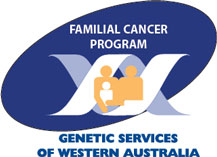Familial Cancer Program
We provide an extensive clinical genetics service to people and families affected by familial cancers (cancers that run in families); these may include breast, ovarian and bowel cancer.
Cancer risk
Most cancers occur by chance as a normal part of ageing – 1 in every 3 people will have some form of cancer during their lifetime.
Cancer is a common condition. A number of people in your family may have cancer but that does not always mean it is an inherited condition that runs in your family.
What is familial cancer?
Only a small proportion of all cancers – less than 5 per cent – are due to a changed gene that may be passed down through your family. You, and members of your family, may be at increased risk of cancer if you have:
- relatives with cancer at a young age (less than 50)
- relatives with more than one primary cancer (not a recurrence of the same cancer)
- several relatives on the same side of the family who develop cancer
- a relative with a genetic condition that increases his or her risk of cancer.
Find out more about your family health history.
Our services
We offer a range of services to people with a personal and/or family history of cancer. We can:
- provide you with information about familial cancer conditions (conditions that may run in your family which put you at an increased risk of developing cancer)
- assess your risk of developing an inherited cancer based on your personal and/or family history
- assess whether genetic testing may be an option for your family
- recommend risk management options
- discuss lifestyle strategies to encourage good health and reduce your risk of developing cancer
- address any questions you may have about familial cancer
- provide support and short-term counselling
- support and facilitate familial cancer research.
Genetic testing for cancer
Genetic testing is only possible in some families and must start with a relative who has been diagnosed with cancer and is living in Western Australia.
It is important to be aware that genetic testing is not always able to find a changed gene in your family.
If a gene fault is found, testing can be offered to family members who have not had cancer to help assess their risk of developing the condition.
Genetic counselling is required before and after testing and is an opportunity for you to discuss any questions or concerns you may have.
The Familial Cancer Registry
The registry is a service for individuals and families at increased risk of developing cancer.
Find out more about the Familial Cancer Registry.
Where do you provide services?
We offer genetic consultations at our metropolitan clinics at King Edward Memorial Hospital, Rockingham District Hospital and Joondalup Health Campus as well as regional outreach clinics in:
- Albany
- Bunbury
- Geraldton
- Kalgoorlie
- Port Hedland.
Before your first appointment
To provide accurate genetic counselling to you and your family, it is important for us to review as much relevant information about your family history of cancer as possible.
Once we receive a referral we will usually send you a questionnaire to help you collect your family history details. We may also:
- send you consent forms so we can access medical records confirming the diagnosis of cancer in other family members
- contact you to get copies of any other medical reports, doctors’ letters or death certificates for family members who have had cancer.
All information provided before, during, or after your appointment is treated confidentially.
Cost
There is no charge for these services if you have a Medicare card.
More about Medicare.
Patients from overseas may also be eligible for these services under reciprocal health agreements.
Making an appointment
Your GP or specialist can refer you to Genetic Services of Western Australia Familial Cancer Program.
You can contact us directly, however as referrals are preferred you may be directed back to your GP or specialist.
Appointments may take up to 1 hour, and you may need more than 1 appointment. You can bring your partner or another support person with you.
More information
This information is provided by

Acknowledgements
Genetic Services of Western Australia and the Office of Population Health Genomics
This publication is provided for education and information purposes only. It is not a substitute for professional medical care. Information about a therapy, service, product or treatment does not imply endorsement and is not intended to replace advice from your healthcare professional. Readers should note that over time currency and completeness of the information may change. All users should seek advice from a qualified healthcare professional for a diagnosis and answers to their medical questions.